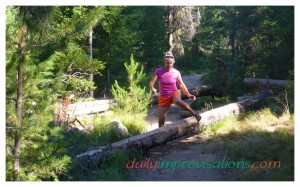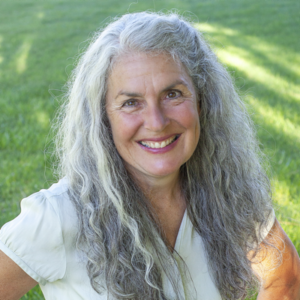While I have been running for fun and exercise off and on throughout my life, I have not ever run nearly as many miles as I do now, after the age of 50. As is common, I ran in high school and college, though mostly non-competitively, and never more than 5 miles at once. In my 20’s to 40’s, I had several children to care for, various injuries, post-pregnancy bladder issues, and lack of inspiration in my generally sleep-deprived state. I exercised regularly, but on a limited schedule. Even though I knew I felt better for doing it, it often felt like boot-camp.
Unlike many stories I have heard, there was no spiritual or health crisis that motivated me to run then, or more after age 50. I thought of it as fun, even if I didn’t always want to get up before dawn to fit it in. Also, besides just having a desire to not become unnecessarily or prematurely decrepit, I wanted to have my best shot at keeping up with my active husband and kids. I don’t mean keep up in a race, but rather to be part of their lives and activities. So, when the kids were mostly grown, and my responsibilities became more flexible, I found myself thinking of running “more.”
I wasn’t sure I could and I wasn’t sure what kind of mileage I was going to be able to attempt. Probably 3 miles… But then, one thing led to another and this past summer I was training for a marathon, which I completed this fall in spite of trouble. It helped that I had several 5K’s, 10K’s, 4 sprint triathlons, and 2 half marathons under my belt, but how DID this happen? Sure, I had maintained a basic level of fitness over the years, but I never expected to be stronger and have more endurance after age 50 than any other time in my life! This result is antithetical to what I thought I had heard about aging my whole life. I’d like to tell you some of the things that I think have been important for this to happen to a normal, aging woman such as myself.
1. Build an endurance base. I had done some of this accidentally at various time in my life without realizing it. When I began building my endurance base on purpose last year, it increased my enjoyment of running exponentially.
2. Don’t worry about speed and comparing times. Your body can only do what it can do without injury. Speed will probably come later, after the endurance base is stronger.
3. The corollary of #2 is “don’t worry about speed workouts” very much. I have read about 10 running books this year, and even those that have a fairly regimental approach to workouts eventually slip into the explanation that an aging runner may be best off not pushing speed excessively in “speed workouts.” A bit more digging reveals that many elite athletes do close to 80% of their workouts at a very comfortable pace to safely put on the miles. After about 6 months of base training, I found that adding some speed at different points in a run is coming more naturally, and is more fun. Importantly, it is coming with little or no pain in joints and muscles. Read 11 tips for speed training here.
4. Add miles “gently,” to quote a barefoot runner friend of mine. I know this now, but it still seems I need to remind myself regularly.
5. Vary the lengths of the runs. It is easier on the body if every run is not to the max limit. It is also mentally rejuvenating to get done with some runs and feel like it has been totally conquered AND you could do more. I usually play with speed more during my shorter runs, then frequently find myself going a bit faster on my next longer runs. Not always, but with a gradual trend to comfort at faster paces.
6. Consider “cross-training.” This might be better described as “cross-activities. There is no reason these can’t be fun in their own right. The idea is to let certain muscles rest from bearing the heaviest load of activity, and the variety tends to freshen the perspective. I swim and bike often, which are more along the lines of common exercise, but many of my other activities are multi-purpose. I garden (yoga, strength training), dance (aerobic, balance, core-building), do housework (low lever endurance), and sing and play the flute (breathing training, increases cardiovascular capabilities).
7. Rest regularly and without guilt. When you are feeling extra tired. When you are sick. I know some people “push through,” but to rest is not a sign of weakness. It is a sign of wisdom and priorities. Your base will not be wiped out. You may likely prolong your illness if you stress your body when it is working on the healing process. This doesn’t mean you can’t get fresh air or walk around, depending on what is going on, but be kind to yourself.
8. Learn some self massage. Foam rollers can be very useful. So can knowledge of trigger points.
9. Study the advantages of running, and being, barefooted as much as possible. This gives a balance and spring to running that is lost in shoes. It takes some time to get used to it, but I would not be running the distances I have been without it. Here is my simple beginners guide to barefoot running.
10. Injury or illness don’t equal old age and stop moving. There is almost always a way to work through it and be glad you did.
11. Be patient with the warm-up period of any exercise session. No bouncy stuff or sudden bursts of movement in the first 10-15 minutes for sure. Let the heart and muscles ease into activity, and you will likely find yourself suddenly feeling like a kid again.
12. Don’t confuse the effort of reasonable movement with pain. Be cautious about exerting yourself too rapidly over time, but then make a study of what feels exhilarating and what makes you want to never run again. Test it carefully, and then enjoy your progress.
I am not, nor have I ever been a professional or high-profile runner. I don’t view running, or any exercise, as my main hobby or source of fun. I am not of Olympic caliper, by any stretch of the imagination; and I still have to work diligently for the progress I make. Still, I have made significant progress over the last two years and am having more fun than ever. To top it off, it is fun to run around the yard with the toddler grandkids and have them get tired first, then wonder if someone should tell them that “Lulu can run a marathon. You can’t get away.”

